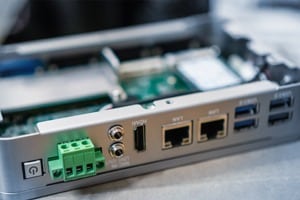Embedded PC explained simply: modular industrial PCs for logistics
Embedded PCs play an important role when it comes to optimally coordinating applications in IT or logistics. As industrial PCs, they always have a modular design and are specially tailored to the task area in which they are used. As an embedded system, they are designed for regulation or control tasks, some of which differ significantly from classic standard PCs in terms of their requirements profile.
proLogistik explains the structure and function of an embedded PC, highlights the advantages and gives examples of possible areas of application.
Explanation: Structure of an embedded PC
In the context of warehouse management, it is important to provide precisely those functions that are important for the user in the specific situation. An order picker, for example, uses a handheld or mobile data capture device (MDC) to intuitively enter important information or tick off tasks. These devices are designed in such a way that they provide the highest power density specifically for this task.
Specifically, an embedded PC is characterized by a high degree of automation. This is always embedded in the respective application environment, which also explains the English name. Only those components are installed that are actually necessary. For this reason, certain interfaces or associated peripheral devices are no longer required if data is transferred via WLAN or Bluetooth, for example. An embedded PC is also characterized by its consistently robust and durable individual components.
An overview of the components that characterize an embedded PC:
- CPU module with mains connection
- Various interfaces (USB, Ethernet etc.), depending on the application focus
- Operating system
- Terminal block (bus terminal)
- Interfaces for fieldbus (Industrial, Profibus, etc.)
Functionality and task of an embedded PC
The special feature of an embedded PC is that it typically has a modular structure and has been specially designed for individual industrial applications. Of course, there are differences in terms of usability, which depends on the performance class of the selected components. An embedded PC is used for the following tasks in particular:
- Control and monitoring of industrially used machines or systems
- Independent handling of individual work steps (e.g. picking, labeling) without the aid of specific peripheral devices
- Continuous operation by changing users, for example in warehouse management
- Can also be used in difficult working environments (deep-freeze areas, high hygiene requirements in the food industry, areas with splash water and contact with moisture)
In short: the embedded PC is available with individual specifications, depending on the desired area of application. As a result, there is a certain range that includes fanless embedded PCs equipped with PoE ports, IP-protected embedded PCs designed for extreme temperatures or expansion slots.
Areas of application and advantages of an embedded PC
A look at the application scenarios in which embedded PCs are used shows the range of possible uses. These range from consumer electronics, for example in streaming boxes, televisions or games consoles, to medical and industrial technology, aerospace and classic telecommunications devices (industrial PCs such as the Pro-V-Pad Classic from proLogistik and others).
Control or measuring units are often developed on the basis of an embedded PC. They are then characterized by a function specifically geared to this task, which of course has certain advantages:
- Cost-effective, as low-maintenance or completely maintenance-free use
- High functionality even in a small space, for example by eliminating unnecessary components
- Low power consumption and high energy efficiency
- Configuration specific to your own needs (including display, touchscreen, processor, interfaces, operating systems or compatibility)
